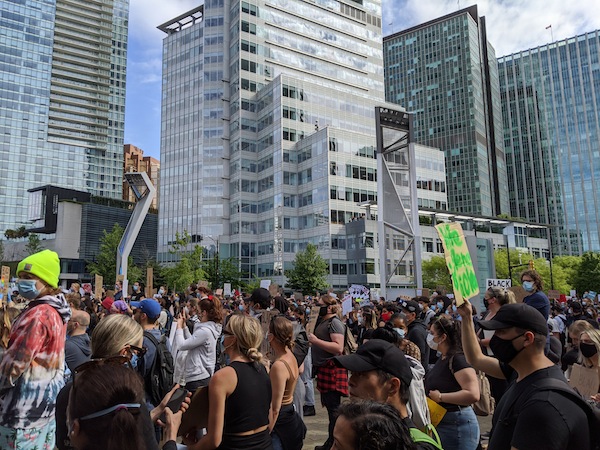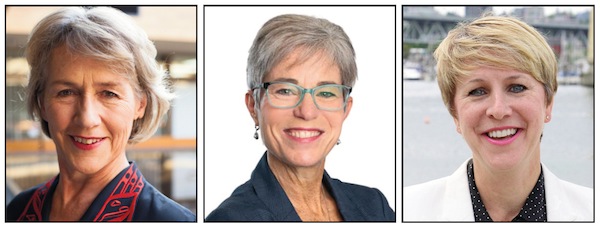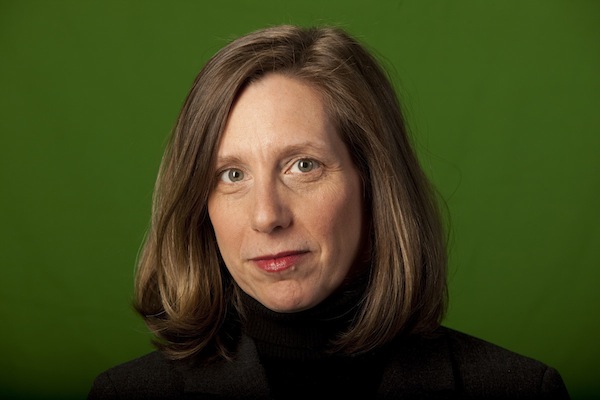As a young adult, I was often criticized for being too blunt. I didn’t always behave the way that my family wished I would. I would call people out when they were being inappropriate. This got me into trouble. And, to be honest, that didn’t always bother me enough to stop doing it.
Others made me feel embarrassed – because my job, throughout my teen years, was to behave properly, say the right things and “act like a lady.” In Virginia, this was necessary. My mother served the Jewish community as a director of education and, later, as a temple administrator, and her children’s behaviour was sometimes a reflection on her.
Though my mom was in charge of a $6 million renovation the year before she retired, she was often slighted in her professional life because of her gender, which affected me, too. My body and behaviour were policed, for example. I was told that I shouldn’t be running by the temple in my leggings (running clothing), as “people” looked at me. What was meant by that?
I looked like my mom, and my (in today’s view, entirely appropriate) exercise clothes caused men to look at me – and, therefore, were an embarrassment. Even as a Reform Jewish professional, my mom was a woman. That was problematic. As her daughter, my body and presence could be embarrassing, too.
Being Jewish in Virginia meant there weren’t many Jewish kids in my public school classes. Even weirder, it was being the daughter of a Jewish professional in what was then a small Jewish community that made me understand what it felt like to feel “othered.” People looked at me differently.
It also made me see those who were always treated “differently” – like people of colour. I saw how much harder things were for them. This isn’t ancient history. I graduated from high school in 1991.
After I finished university, I went into a special inner-city accelerated teacher’s program. This allowed new graduate students earning their master’s in education a chance to do their student teaching by replacing teachers who “needed training” in the Washington, D.C., public schools. This program supported an ailing inner-city school system where the (largely African-American) teachers worked longer to earn their retirement pension than anywhere else. These tired and burnt-out high school teachers lacked opportunities for continuing education and basic classroom supplies. They often just needed a break. Most of the students’ families struggled financially and, yes, most of the kids that I taught were African-American or from immigrant families.
In those classrooms, I saw how privileged I’d been in the suburbs. The D.C. public schools were underfunded and in terrible disrepair. Imagine magnificent historic buildings with high ceilings and real slate chalkboards – but it rained inside, the copiers were broken and there were no class sets of books to assign.
When there were fires, the fire trucks didn’t show up. In Anacostia High School, the African-American principal put out the fires himself. These communities weren’t offered basic city services. Instead, there were frequent arrests, for things like “driving while black,” as my friends put it.
I’ve been sad, angry and frustrated about this racial injustice for a long time. I’ve witnessed it – and Jewish tradition tells us to speak out, to pursue justice and to try to fix the world’s wrongs.
Yet, just as Judaism teaches us what it means to be set apart, or even discriminated against, ostracized and singled out, our (mostly male, white, privileged) culture has pushed us to behave according to its norms.
“Being a lady” often meant not embarrassing our families by calling out people who said racist or inappropriate things. It meant that I shouldn’t run by, entirely covered up, because my female body might be a distraction.
Being ladylike? It’s learning that how one looks is distracting, offends others, is reason enough to stay home, or feel ashamed. It’s struggling between speaking out and keeping quiet, so as not to pick a fight.
Sometimes, I’ve just chosen to keep my mouth shut, because it’s not worth the fight, it’s not ladylike, or “Honey, now’s not the time.” But it was wrong to stay quiet when I heard people making others “less” or demeaning them. It’s wrong to say nothing as someone uses degrading language, tells racist stories or implies that someone “deserved what he got” essentially by being a black person or an indigenous person in the wrong place at the wrong time.
Growing up as a Jewish person in a non-Jewish area, and as a female, gave me some insights into this discrimination, but, if I behaved the “right way,” or didn’t act “too Jewish,” (?!) I could pass where I grew up and where I live now, in Winnipeg.
In the Talmud, in Shabbat 95a, there’s a discussion about how to properly sprinkle the floor of a room on Shabbat. It’s a way of cooling a hot space, but it isn’t allowed by the rabbis on Shabbat if the floor is dirt because a dirt floor could be changed by water remolding it. If the floor were stone, it might provide cooling and still be allowed. One sage concludes that a wise woman would know how to do this and avoid breaking Shabbat rules.
The rabbis gave credit to smart women for knowing how to follow the rules and make a change for the better.
This pandemic year has been about colossal change. It might also be time to ditch the “ladylike” models in favour of those talmudic wise women, who make change happen, “cool things down” during a hot summer and find ways to do it while mostly abiding by the rules.
The rules themselves, whether talmudic or modern, are still largely made by men. It’s time to recognize that the “others” – Jews and members of other minority faiths, women, those in the LGBTQ+ community, people of colour and everyone who still faces discrimination and racism – deserve the equality and justice we are all due.
It’s time. In fact, it’s long overdue. Our history as Jewish people, as Canadians and North Americans, requires us to own this injustice and fix it. It’s time to change ingrained, prejudiced habits and speak out.
Jewish tradition teaches that we’re all made in the Divine Image, in every colour and gender. Now we must step up, say so and act as if we mean it.
Joanne Seiff has written regularly for CBC Manitoba and various Jewish publications. She is the author of three books, including From the Outside In: Jewish Post Columns 2015-2016, a collection of essays available for digital download or as a paperback from Amazon. Check her out on Instagram @yrnspinner or at joanneseiff.blogspot.com.




